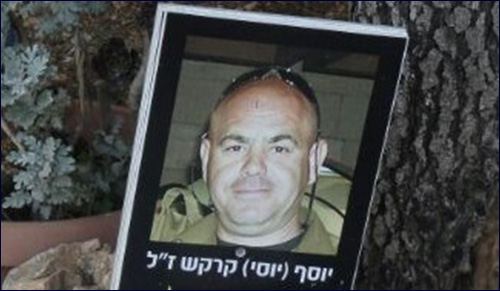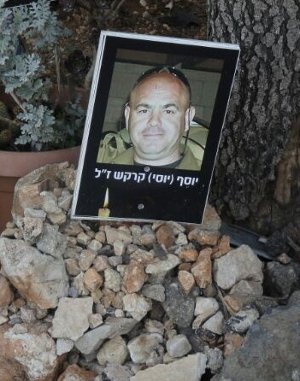 Iran’s Attack on Israel
Iran’s Attack on Israel


9 min read
9 min read
4 min read
6 min read
6 min read
Yosi Karkash was killed in the Second Lebanon War when a Hezbollah rocket landed on his platoon, killing him and 11 comrades.
Over 23,000 Israeli soldiers have died defending the country since Israel’s independence in 1948. As the Talmud teaches, each of those lives is considered an entire world. But numbers don’t do justice to the stories of the individual soldiers. This is the story of one of the young men who paid the ultimate sacrifice for his country and his people.
Yosi Karkash was a working father of two in his early 40s in Kfar Giladi, Israel. He had served in the Tzanhanim (Paratroopers) unit of the Israel Defense Forces during his regular army service in the 1980’s. In 2004, he was given the option to retire from the army reserves. He chose not to. “The idea that you were going to protect Israel – that’s what drove him,” one of his family members told Aish.com. “These decisions come from the soul.”
 Yosi's picture at a memorial to the 12 soldiers outside
Yosi's picture at a memorial to the 12 soldiers outside
of the Tel Hai cemetery where they were killed.
Yosi was driven by a sense of patriotism – life itself was meaningful to him as long as he lived in the Land of Israel. His parents – who fled persecution in Muslim countries – met in Israel in 1949. His mother’s family had experienced religious persecution in Tunisia, witnessing the burning of their home. His father’s family left Portugal as a result of the inquisition and spent centuries in Turkey, a history Yosi was ever conscious of.
A father of two daughters and a brother of four sisters, Yosi was a patriarchal figure of his loving family. He felt the duty to continue his service in the reserves and chose to stay on after the end of his mandatory service at age 40.
In July 2006, Israel both Hezbollah and Hamas provoked Israel by kidnapping soldiers. Hamas kidnapped Gilad Shalit in the South, and Hezbollah killed and kidnapped the bodies of Ehud Goldwasser and Eldad Regev (though their death in the ambush was not known at the time).
The visceral images on television were of individual victims. Goldwasser and Regev were fathers. Shalit was a 19 year old soldier. The kidnappings would spark the Israel-Hezbollah War of 2006, and Israel would soon need its reserves.
Yosi personally related to these stories, and the places under attack by Hezbollah were in the North near Yosi’s childhood home in Afula. He was ready to mobilize.
His nephew Eshel, who was stationed in near Gaza at the time, says that Yosi’s call up suddenly doubled the family’s concerns. “I am the 18-year-old who was in the army full time. I’m the one they’re supposed to be worried about.” But as Eshel explains, the outbreak of war suddenly forced reservists, fathers, uncles, family men in their 30s and 40s in to harm’s way as well.
Yosi’s unit would become a harsh reminder of that reality on that summer morning in the North. On August 6, Yosi’s unit was waiting to be sent in to Lebanon. At the time, the firing of Katyusha rockets at civilians was Hezbollah’s main weapon against Israel.
Yosi’s squad was together in their battle gear, waiting. There were no shelters available for the unit. Eshel explains that “in the army, you get used to the rockets, and after a while you think ‘nothing will happen to me.’” Yosi’s family is still unsure as to why they did not have shelter, but it is believed that they chose to stay out of overcrowded shelters to give families protection instead.
The unit chose to wait in the parking lot of the Tel-Hai cemetery, famous as the burial place of Zionist pioneer Joseph Trumpeldor. The cemetery has a brick wall, which would at least protect the soldiers from one side. They figured that if a rocket landed, it could only pose a danger from one side. Moreover, Tel Hai had never been hit in all of the years of shelling endured by the Galilee.
That morning, a Katyusha rocket landed right on the platoon, killing 12 men.
Twelve Israeli mothers lost their husbands. Dozens of children lost their fathers. “You always hear about soldiers dying,” Yosi’s family members told Aish.com, “but you don’t hear about the tarnished worlds of each family member around them.”
One also does not hear about the survivors in the platoon – in this case, two of them remain in psychiatric counselling to this day and are unable to work. Yosi, who was responsible for all supplies for the platoon sent one of his soldiers to the truck to fetch the squad’s food. Another – commanded by Yosi – had gone for water. And just like that, their lives were spared. Both witnessed the rocket hit their friends. A few minutes earlier, and they would have been gone too.
Yosi’s wife, Orna, found out about the attack in the afternoon. She knew something was wrong – she had tried to call Yosi several times but received no answer. Eventually, army officials knocked on her door. She heard the news from them.
Yosi’s family recalls: “You don’t know how to react in that situation. You just don’t know what to do.” His nephew heard the news after celebrating a Brit Mila in the morning. He was hosting guests from out of town who had come in for the occasion. “My mother was screaming. Our guests left right away. Nobody knows how they are supposed to react.”
Yosi’s father got sick immediately after the 30- day mourning period known as shloshim. He went on to live the rest of his life with Alzheimer’s. He died six years later. Yosi’s mother survived him, but according to her grandsons, she is constantly somber.
Yosi’s children, Linoy and Lihi were ages 17 and 11 respectively at the time. But Orna felt the support from friends, family and many caring volunteers. Lihi’s Bat Mitzvah was organized and conducted the next year by Yosi’s army friends, the survivors of the blast. Today, the relationships of the families are so important to them, that they visit the cemeteries of their husbands and fathers together. Each year, on Yom HaZikaron, Israel Memorial Day, they drive around the entire country to the various cemeteries that where the bodies of the 12 men are laid to rest.
Yosi’s family takes comfort in knowing that he died defending the Land of Israel. Yosi’s sisters tell Aish.com: “Our parents were pioneers; they got married on a rainy day in the mud. They told us ‘you can overcome anything.’ And whenever they overcame a difficulty they said, ‘Thank God, we are living in the Land of Israel.’”
It is in that spirit that they try to overcome the loss of their brother, father, uncle, confidant, mentor, and inspiration. This Yom HaZikaron, before visiting the burial sites of Yosi’s comrades around Israel, they will travel north to Yosi’s grave site in Afula. A difficult day no doubt, they can take comfort in the heroism of their father, husband, brother, uncle, and son. Like thousands of Israeli soldiers, he died fighting so that they could live.
